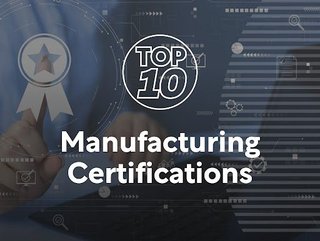Top 10: Manufacturing Certifications

In the world of manufacturing, precision, safety and efficiency are essential for staff and customers, as well as factories, products and the supply chain. Certifications are a vital part of establishing standards and ensuring adherence. Here, we look at the Top 10 manufacturing certifications that manufacturers should be aware of.
10. Six Sigma Certification
The Six Sigma Certification is a range of techniques and tools, which aim to improve process efficiency and help manufacturers to identify defects. There are different certification levels to show the manufacturers proficiency.
Six Sigma certifications are offered by organisations and training institutions. It was first developed by Motorola and also popularised by General Electric.
9. UL Certification
The Underwriters Laboratories (UL) certification verifies a product's safety, particularly electrical and electronic items.
A UL Certification signifies that a product has been tested and that it fits specific standards of safety and performance. The certification assures consumers and regulators that the product has met rigorous quality requirements.
8. RoHS (Restriction of Hazardous Substances) Certification
Another way to prove the safety of electronic and electrical products, is with an RoHS (Restriction of Hazardous Substances) Certification. Such a certificate proves that the product has met any restrictions regarding hazardous substances, for example, mercury. The certification is overseen by the European Union and manufacturers must obtain a RoHS Certification, in order to sell their products across the European market.
7. CE Marking: Conformité Européenne
Another certification which proves that an item complies with European Union requirements, is CE Marking: Conformité Européenne. This focuses on the safety and environmental standards of a product and it is a legal requirement for all items for sale in the European Economic Area (EEA). Importantly, this is a self-declaration, made by the manufacturer and not acquired by a third-party. Manufacturers add the CE mark to a product themselves.
6. GMP (Good Manufacturing Practice)
The GMP offers a range of guidelines, which proves that a product has been produced and controlled according to quality standards, which is essential in pharmaceutical and food manufacturing. As a result, GMP regulations are overseen by the relevant regulatory authorities, like US Food and Drug Administration (FDA) and the European Medicines Agency (EMA).
5. AS9100: Aerospace Quality Management System Certification
Perhaps not quite as well known to the average consumer as the above, the AS9100 is a standard for the aerospace industry. The AS9100: Aerospace Quality Management System Certificate is used to prove the quality of the design, development and production of an aerospace product. It is issued by the International Aerospace Quality Group (IAQG).
4. ISO/TS 16949: Automotive Quality Management System Certification
ISO/TS 16949 is a certification which relates specifically to the automotive sector and specifically focuses on quality management systems for the supply chain. The certificate is issued by the IATF (International Automotive Task Force), a group of automotive manufacturers and the related National Automotive Industry Association. The group is united to provide improved quality products for automotive customers across the world.
The ISO/TS 16949 quality management standard incorporates ISO 9001 requirements alongside automotive-specific requirements.
3. ISO 45001: Occupational Health and Safety Management System (OHSMS) Certification
In the manufacturing sector, the ISO 45001 certificate helps manufacturers to:
- Improve employee safety
- Reduce workplace risks
- Ensure better working conditions.
Certificates are issued by the International Organization for Standardization (ISO) and aim to help businesses to build a safer work environment, with fewer accidents and which meet all legal requirements in regards to occupational health and safety.
2. ISO 14001: Environmental Management System (EMS) Certification
Another one from the International Organization for Standardization is the ISO 14001, which offers a clear framework for environmental management. Manufacturers use the ISO 14001 to monitor their environmental impact, advance their sustainability initiatives and meet environmental regulations.
At the start of 2024, Dr Sung Hwan Cho took on the role of ISO President. In his welcome message, he explored how ISO could increase its outreach.
“We need to increase participation to guarantee the global relevance of ISO standards and achieve a more balanced, inclusive and sustainable standardisation landscape.”
1. ISO 9001: Quality Management System (QMS) Certification
In London, 1946, 65 delegates from across 25 countries met to discuss the future of global standardisation. Then in 1947, ISO was formed with 67 technical committees, led by experts in their respective fields. Their aim was to ensure product safety.
Now, there are 25,156 International Standards covering almost all aspects of manufacturing and 170 members representing ISO in their country, alongside 826 technical committees and subcommittees.
The ISO 9001 is an international standard, which clearly sets out the criteria for a quality management system and is used by manufacturers to prove their commitment to quality and customer satisfaction.
******
Make sure you check out the latest edition of Manufacturing Digital and also sign up to our global conference series - Procurement & Supply Chain 2024 & Sustainability LIVE 2024
******
Manufacturing Digital is a BizClik brand.
- Exotec: Warehouse Automation & The British Alcohol IndustrySmart Manufacturing
- SAP’s AI Joule set to Transform Supply Chain ManufacturingAI & Automation
- Top Ten: Diverse Companies in ManufacturingProduction & Operations
- How Smart Factories are Reshaping the Manufacturing SectorSmart Manufacturing






